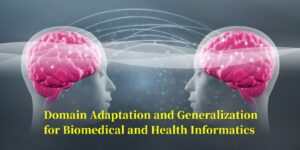 The data used in BHI often comes from varied sources and is subject to differences due to demographics, equipment, protocols, and more. Such variability can severely impact the performance of conventional machine learning models when applied outside the settings they were trained on. This issue is known as domain shift or dataset shift. Thus, there is an unavoidable obstacle in BHI–how to mitigate the domain shifts in BHI? Unfortunately, a majority of existing approaches in the BHI community ignored the problem or just left it for the future research. Recently, transfer learning has been proven to be effective to handle the domain shift problem and transfer knowledge from one domain to the other related domains. Now it is the time to face the problem in BHI and investigate it with transfer learning!
The data used in BHI often comes from varied sources and is subject to differences due to demographics, equipment, protocols, and more. Such variability can severely impact the performance of conventional machine learning models when applied outside the settings they were trained on. This issue is known as domain shift or dataset shift. Thus, there is an unavoidable obstacle in BHI–how to mitigate the domain shifts in BHI? Unfortunately, a majority of existing approaches in the BHI community ignored the problem or just left it for the future research. Recently, transfer learning has been proven to be effective to handle the domain shift problem and transfer knowledge from one domain to the other related domains. Now it is the time to face the problem in BHI and investigate it with transfer learning!This special issue highlights the novel applications/algorithms/problems/ideas/datasets/tools of transfer learning which focus on the field of biomedical and health informatics. In this special issue, we are eager to see practical algorithms which deploys transfer learning to challenge the specific characteristics of biomedical, original algorithms which inspires the transfer learning in biomedical, brand-new datasets/tools which benefit the following researchers.
Topics of interest include, but are not limited to, the following:
- Adaptable Diagnostic Imaging Algorithms, such as:
- Developing cross-modality domain adaptation techniques for medical image analysis.
- Generalization of deep learning models for tumor segmentation across different imaging devices.
- Transfer Learning in Genomic Data Analysis, such as:
- Domain adaptation in the analysis of gene expression data across different populations.
- Generalizing predictive models for genetic diseases using diverse genomic databases.
- Robust EHR Systems, such as:
- Cross-institutional adaptation of electronic health record systems to predict patient outcomes.
- Domain generalization in predictive analytics for patient readmission across heterogeneous EHR systems.
- Multi-Source Data Integration for Personalized Medicine, such as:
- Integrative models for personalized treatment recommendations using heterogeneous biomedical data sources.
- Domain generalization techniques for combining clinical and molecular data in precision oncology.
- Survey papers with regard of transfer learning for BHI.
Guest Editors
- Dr. Zheng Zhang, Harbin Institute of Technology, darrenzz219@gmail.com
- Dr. Jingjing Li, University of Electronic Science and Technology of China, jjl@uestc.edu.cn
- Dr. Xiaojun Chang, University of Technology Sydney, Xiaojun.Chang@uts.edu.au
- Dr. Yudong Zhang, University of Leicester, yudongzhang@ieee.org
Key Dates
- Deadline for Submission: 31 May, 2024
- First Reviews Due: 01 Sep, 2024
- Revised Manuscript Due: 01 Nov, 2024
- Final Decision: 01 Dec, 2024
